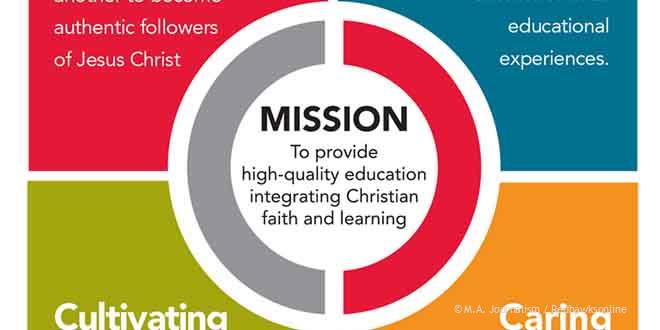More than a century ago and under the Swedish name of the Rev. Eric August Skogsberg, a distinctively Christian institution was built near the banks of the Mississippi River in Minneapolis.
For more than 100 years, Minnehaha Academy has developed from its initial Christian foundation. As a vibrant institution in the Northwest Conference, a regional mission under the Covenant Church, Minnehaha has held onto to its Mission Statement: “To provide high-quality education integrating Christian faith and learning.”
From April and following into the summer, Minnehaha will be assessed on its spiritual formation and fulfillment of its Mission Statement, with the intention of eventually forming a comprehensive plan or strategy in regards to improving its faith-based learning.
High school principal Jason Wenschlag explains the purpose of creating a strategy.
“The spiritual aspect of our school is so critical to our mission and there are so many different moving pieces about integrating faith with learning,” Wenschlag said. “What does that look like? How do teachers integrate faith with learning? What do students experience? How do we design our current chapels at both campuses? Does our current structure of having one or two chaplains at each building make the most sense?” The questions in which Wenschlag poses are ones that will be explored in the professional assessment process carried out by Arbor Research Group.
Arbor Research Group is an organization that specializes in collecting and analyzing information about spiritual formation in specific institutions. Though Minnehaha goes through an accreditation process every seven years, the accreditation organization ISACS is secular. Thus, Minnehaha hired Arbor Research Group to assess the faith components of the school.
“If we are seeking to integrate Christian faith with learning, then assessment is important,” President of Minnehaha Donna Harris said. “It’s important for an institution that seeks to help students on their journey of faith to [assess its effectiveness.] We want to be able to confidently say, maybe to a prospective parent, ‘yes, we know that we are implementing the right things to support spiritual formation because we’ve taken the time to bring an outside expert in to give us an assessment.'”
Two years ago, Minnehaha was given a multi-year grant of $300,000 given over a five year period to support spiritual formation work within the school community. The grant dollars have been used for chapel speakers and musicians, the purchase of resources for Bible courses and Bible curriculum, and to cover the cost of spiritual retreat days for faculty and staff. The money from this grant was also used to pay for the research conducted by Arbor Research Group.
In the time spans of April 21-22 and May 9-11, Arbor Research Group was invited into Minnehaha classrooms to conduct student focus groups in which students in grades 3-12 were interviewed about classroom time, extracurricular activities and social dynamics of school, pertaining to their individual faith. Each student that participated in these surveys were given active consent by their parents and the recordings of their interviews will be destroyed at the conclusion of the study for confidentiality reasons. The research group followed a similar process when interviewing teachers, faculty, and the school’s Board of Trustees. After the assessment, the research group may provide practical suggestions, possibly regarding chaplains, frequency of chapels, and questions to ask when hiring employees of faith. Though these anticipated suggestions can impact Minnehaha’s long-term strategy in spiritual formation, Wenschlag believes that they will only come into effect after adequate contemplation by the school. According to Harris, a few immediate changes may occur next fall, potentially in regards to the alignment of Bible curriculums from preschool through 12th grade and also with chapel experiences. No immediate changes will directly affect the employment of current staff.
After the conclusion of work by Arbor Research Group in July, the spiritual formation CIT will form a comprehensive strategy to improve its spiritual formation. The strategy will be developed under the leadership of the Northwest Conference Board Committee, a committee of leaders under the Covenant Church that govern Minnehaha; and the Spiritual Formation Collaborative Initiative Team, a recently added task force who collaboratively focus on faith components of Minnehaha. The spiritual formation CIT includes Wenschlag, Director of Special Academic Services Elaine Ekstedt, science teacher Nancy Cripe, band teacher Ryan Larson, and the lower school chaplain the Rev. Greg Bestland.
The process of research and strategizing that will occur in the next few months is meant to confirm the effectiveness of Minnehaha’s spiritual formation efforts while also providing insight to aspects in which the school can improve.
“In 100 years from now, we want this school to still be rooted in its original mission and we can’t do that well unless we are periodically assessing and improving,” Harris said.

